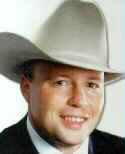NEWS PAGES
News
Sports
Lifestyle
Obituaries
Archive
Photos
ADVERTISING
Commerce
Bookstore
Classified
Economic Development
TRAVEL
Area Papers
West Texas
ARCHIVES
News Archive
Photo Archive
STAFF
Smokey Briggs
Jon Fulbright
Peggy McCracken
Rosie Flores
LINKS
Other Sites
Daily Newspaper and Travel Guide
for Pecos Country
of West Texas
Opinion
Tuesday, June 11, 2002

Sage
Views
By Smokey Briggs
The living and
the undead
At what point does life end and existence begin?I have always been fascinated by that question. I am convinced that there is a point where you are not living; you are just sucking up oxygen.
I do not know exactly where that point is.
We have created a very safe world here in America in the last 50 years. It is an incredibly safe world when you really think about it. We expect to live 70 or 80 or 90 years these days.
Today, we have come very close to completely divorcing death from everyday life. Death is not the constant companion to us as it was our forefathers or even our grandfathers. When death does come, it is often in a sterile environment where it can be quickly curtained away before it upsets the living.
It seems though, that the more remote death becomes in our daily lives, the more we fear it.
Of course, as death becomes more remote, it is easier to believe we are nearly immortal. It is easy to shrug away the constricting yet comforting ties of religion.
Who needs a god when death does not loom nearby?
I am sure it is a consequence of evolution that human consciousness generally dwells on the fairly immediate future. Sitting in a cave, having survived another day of chasing things with sticks and being chased by things with teeth, contemplating your long-term survival chances could not have been the road to mental health.
That you survived today and that tomorrow looked promising had to be enough. As we learned to think, we probably learned not to think too much as well.
Today, we find ourselves as a species at an opposite extreme from our cave-dwelling forbearers. Death is no longer constantly at our shoulder to remind us of our mortality and we have become very good at pretending it will not happen to us.
One result seems to be a predilection with making the world safer and safer _ no matter the costs to enjoyment of life.
Simply being alive, it seems, is becoming more important to us than living.
Where our forefathers contemplated an afterlife, we contemplate the extension of life, even if it is in very small increments. The price of such extension no longer seems important _ only that there is a possible extension.
If it will make us safer then we pass a law. We start groups and lobby governments. We preach and we harp. We also lose much of our sense of proportion and common sense.
Cigarettes, alcohol, fatty foods, salt, seatbelts, helmets, riding in the back of pickup trucks, air bags, jeeps that roll when driven by fools _ all have been condemned soundly as too dangerous to be allowed. The list of behaviors and products we have curtailed or condemned is long.
Other behaviors and things will follow.
What is worrisome is the trend _ the trend toward society dictating what personal choices are safe enough for the individual and which ones are not.
Some folks do not seem to draw the line between living and sucking up oxygen where I want it drawn. I would rather they did not feel entitled to protect me from myself while I live my life.
I have bad news for all of them.
Death will come. When it does, what will matter is not the number of years you count, but the life that was packed into those years.
EDITOR'S NOTE: Smokey Briggs is the editor and publisher of the Pecos Enterprise whose column appears on Tuesdays. He can be e-mailed at: smokey@pecos.net
Our View
Popular opinion is no substitute for evidence
Well, 27 years after the fact, Michael Skakel is in jail serving time for the murder of Martha Moxley.For decades, it was rumored that Skakel was not prosecuted because of his relation to the Kennedy family.
A quarter of a century later, he has been prosecuted and convicted. At his trial prosecutors were not able to produce a single piece of hard evidence linking him to the crime.
Instead the jury heard a string of classmates of Skakel's from a school for rich kids with drug problems who claimed he had confessed in one way or another.
In the South, we have recently witnessed a string of prosecutions of elderly men in connection with the racial strife of the 60s. All have been convicted despite 30+ years of dust that lay on the memories of witnesses and the evidence.
Prosecutors claimed that the men were not prosecuted directly after the crimes because they were protected by the racial bias of the times.
The truth is that the actual evidence produced in each of these cases was very thin. Without the high-profile nature of the cases conviction would have been doubtful.
Are all of these men guilty of the crimes they were convicted of?
Maybe.
Are we guilty of dispensing justice at the whim of popular opinion?
Probably.
Pecos Enterprise
York M. "Smokey" Briggs, Publisher
Division of Buckner News Alliance, Inc.
324 S. Cedar St., Pecos, TX 79772
Phone 915-445-5475, FAX 915-445-4321
e-mail newsdesk@nwol.net
Associated Press text, photo, graphic, audio and/or video material shall not be published, broadcast, rewritten for broadcast or publication or redistributed directly or indirectly in any medium.
We support Newspapers in Education
Copyright 2002 by Pecos Enterprise

